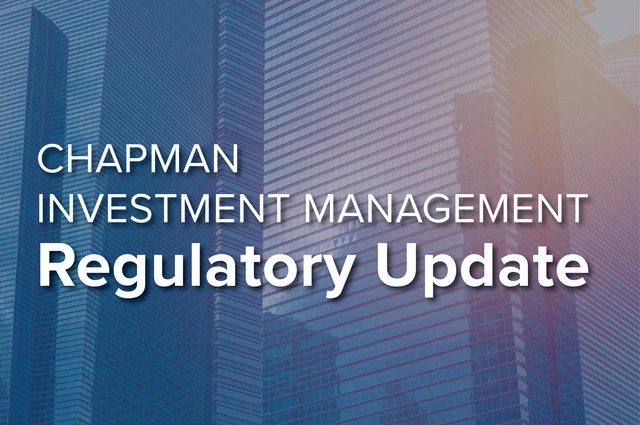- Topic: Marketplace Lending
30 matches.
Chapman wrote the book on the marketplace lending regulatory landscape that the entire industry has come to rely upon. First published in 2013, the 2024 update covers a vast array of topics affecting the marketplace lending industry.
On June 5, 2023, the Governor of Colorado signed into law House Bill 23-1229 which contains a purported “opt out” of federal preemption made available to state chartered, FDIC insured institutions. It appears aimed at least in part to online lenders making loans to Colorado residents. Whether this action will trigger additional states to attempt a similar move or whether this legislation is even valid will likely end up in litigation, teeing up another potential battle on federal preemption vs. states rights and likely leaving Colorado borrowers in limbo for some time to come. Of note, this law does not become effective until July 1, 2024.
A recent federal district court decision out of Massachusetts found that a bank was the true lender on a loan subsequently transferred to a trust consisting of student loans. Robinson and Spears v. Nat’l. Collegiate Student Loan Trust 2006-2, 2021 WL 1293707, Case No. 20-cv-10203 ADB (D. Mass. April 7, 2021).
In the past few days, two courts have actions that are of significance to marketplace lenders and their funding sources.
In 2015, the Second Circuit Court of Appeals issued an opinion finding that, under the doctrine of federal preemption, a non-bank assignee of a bank loan could not charge and collect the rates and fees that the bank could charge and was therefore subject to state law usury limits.
- The Banking Law Journal
The Office of the Comptroller of the Currency recently issued its final rule codifying as a regulation that the interest charged on loans that is permissible before the loan is transferred remains in effect after the loan is transferred.
The parties to the closely watched litigation by the Attorney General of Colorado as Administrator of the Colorado Uniform Consumer Credit Code against two marketplace lending platforms have agreed to settle the litigation.
On July 22, Online Lending Policy Institute hosted a conversation covering the new FDIC rule issued on June 25 which adopts the common law doctrine of “valid when made” as well as other topics related to fintech.
The Office of the Comptroller of the Currency and the Federal Deposit Insurance Corporation have been quite active in issuing or proposing new regulations and initiatives focused on financial technology and innovation in financial services.
On June 11, the Online Lending Policy Institute hosted a conversation covering the expansive advance notice of proposed rulemaking in the fintech space.
On May 29, the Office of the Comptroller of the Currency issued its final rule codifying as a regulation that the interest charged on loans that is permissible before the loan is transferred remains in effect after the loan is transferred.
H.R. 748 better known as the CARES Act or more informally as the $2 trillion stimulus bill signed by President Trump on March 27, 2020, contains one important provision for all consumer lenders and another two provisions related to federally-backed mortgage loans.
The state of Colorado initiated two lawsuits against online lending platforms. The suits alleged that the platforms had violated the state’s Uniform Consumer Credit Code by charging interest and some fees in excess of those allowed under Colorado law and that the consumer loan agreements utilized a non-Colorado governing law provision, also in violation of the law.
On September 30, the Governor of California signed into law Senate Bill No. 1235, which amends the California Financing Law (previously known as the Finance Lenders Law) to impose new disclosure requirements on licensed commercial lenders and brokers including for online lending programs doing business in California.
- May 2017The Banking Law Journal
The May 2015 decision of the U.S. Court of Appeals for the Second Circuit in Madden v. Midland Funding, LLC sent shockwaves through the marketplace lending industry, and nearly two years later the questions generated by this case remain largely unanswered. These questions have been further complicated by the long-awaited remand decision from the U.S. District Court for the Southern District of New York.
On February 27, the U.S. District Court for the Southern District of New York issued its long-awaited remand decision in Madden v. Midland Funding, LLC.
- November/December 2016Illinois Banker
Considering the flurry of activity in the fintech arena, is there a place for banks and, if so, what role can banks play? Given that marketplace lending is the most developed form of fintech today, it can be analyzed to see how banks do play important roles and employ different strategies dealing with this emerging market segment.
- Legal, Operations, and Strategy Briefs for Financial Institutions
On Friday, Comptroller of the Currency Thomas Curry announced that the Office of the Comptroller of the Currency will issue limited-purpose bank charters to qualified fintech companies.
- July 25, 2016 (Originally Published July 22, 2016)Lending Times
A recent decision of the Maryland Court of Appeals could require marketplace lenders and others who arrange for federal or state banks to fund consumer loans to consumers residing in Maryland to obtain licenses as “credit services businesses” and could prohibit them from arranging those loans at interest rates exceeding the applicable Maryland usury caps.
On May 10, 2016 the U.S. Department of the Treasury published a white paper entitled “Opportunities and Challenges in Online Marketplace Lending.” The White Paper follows the “Request for Information” which the Department published in July 2015 to solicit public input on various topics concerning marketplace lending.
- May 2016 (Originally Published February 3, 2016)Pratt's Privacy & Cybersecurity Law Report
Pratt's Privacy & Cybersecurity Law Report republished a special edition of Chapman's To the Point! newsletter.
On Friday, March 18, 2016, the United States Supreme Court issued a call for the views of the Solicitor General of the United States before it decides whether to hear an appeal from a Second Circuit Court of Appeals decision rendered last May in the case of Madden v. Midland Funding, LLC.
- Legal, Operations, and Strategy Briefs for Financial Institutions
On March 7, the CFPB announced that it is accepting consumer complaints about online marketplace lenders, giving consumers “a greater voice in these markets and a place to turn to when they encounter problems.” The CFPB also issued a bulletin to provide consumers with information on marketplace lending.
- February 8, 2016 (Originally Published February 1, 2016)Law360
Law360 republished a Chapman Client Alert.
A recent decision of the U.S. District Court for the Eastern District of Pennsylvania has highlighted once again the regulatory risks that the so-called “true lender” doctrine can create for internet-based lenders who partner with banks to establish exemptions from applicable state consumer protection laws.
A recent decision of the Maryland Court of Special Appeals could impact marketplace and other lenders who arrange for federal or state banks to fund consumer loans in Maryland at rates in excess of the applicable Maryland usury caps.
- September 2015 (Originally Published June 3, 2015)The Banking Law Journal
The Banking Law Journal republished a Chapman Client Alert.
In the case of Madden v. Midland Funding, LLC, the Second Circuit narrowly interpreted the scope of federal preemption of state usury laws under the National Bank Act as such laws apply to certain non‑bank loan assignees.
- Legal, Operations, and Strategy Briefs for Financial Institutions
In this edition:
- Telephone Consumer Protection Act Declaratory Ruling
- CFPB First Monthly Complaint Report
- Treasury Department Inquires about Marketplace Lending
- Legal, Operations, and Strategy Briefs for Financial Institutions
In this edition:
- U.S. Supreme Court Will Not Hear CashCall Case – Uncertainty for Marketplace Lenders?
- FinCEN Current Priorities
- Guidance on Youth Savings Programs
- Overdraft Update – CFPB Enforcement Action









